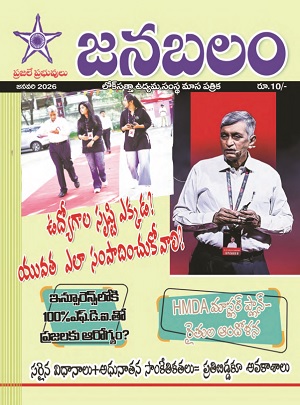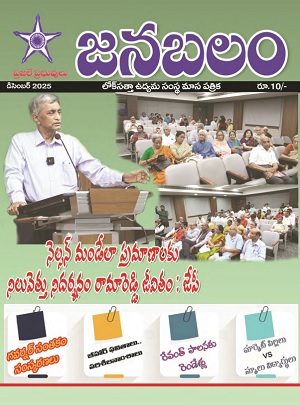by Dr.Jayaprakash Narayan
The central challenges of our polity are the failure of the best and brightest to enter public life and make the necessary sacrifice to accept the burdens of leadership; and the highly centralized governance system which distanced people from the elected leaders and civil servants. The rest are all consequences of these twin failures.
As a result, seven great scourges are hurting the country:
1.Perpetuation of abject poverty despite resources and technology
2.All-pervasive corruption
3.Over-centralization
4.Failure of rule law and the rise of anarchy and criminalization
5.Politics of division, hatred and primordial loyalties
6.Increasing urban-rural divide, and excessive migration to big cities
7.Rise of licentious behaviour, and abuse of alcohol and drugs
Happily, India has also done a few things right in the past sixty years. Strengthening of federalism, a sound institutional infrastructure, preserving freedoms, and rapid economic growth in recent years after decades of stagnation of the license raj are our greatest successes.
We need to focus on a few key changes to preserve our strengths and overcome weaknesses.
Judicial reforms: The recent events showed us how vital it is to preserve the credibility, independence and integrity of the judiciary. We need to create a mechanism for appointments for higher judiciary; and for removal of errant judges. We also need to encourage entry of our best and brightest young men and women into judiciary at lower levels.
Corruption: A strong, effective, independent anti-corruption commission with powers to confiscate property, and ensure swift punishment is the need of the hour. The stink of Commonwealth Games, the many recent scams and allegations, and the obvious rise in corruption everywhere make this an opportune time to fight corruption – in politics, bureaucracy and judiciary.
Decentralization: The recent draft amendment of the Constitution proposed by the Union government is a good starting point. There is broad acceptance in principle, and we must work for its enactment so that the people are empowered, vote is seen by citizens as a valuable tool; there is visible link between taxes and services; and authority fuses with accountability.
Liberalization of agriculture and rural rejuvenation: Agriculture is still suffering under the yoke of the mighty bureaucracy, and license-permit-raj continues in this sector. Consequently, price signals are not allowed to influence production; free trade is not permitted, and farmers are made abjectly dependent on government largesse. A free trade regime in agriculture with adequate safeguards to ensure food security, and protection of farmers from imports will liberate rural economy and transform the lives of 55% Indians.
Political reform: We need to eliminate the role of marginal vote which is at the root of criminalization, vote buying, and electoral fraud. Proportional system of representation with suitable safeguards to suit our conditions; and direct election of the executive at local and state levels will largely eliminate the distortions by creating a new set of incentives, and destroying the existing ones.
Rule of law: Independent crime investigation, independent prosecution, strengthening forensic capabilities, faster legal procedures, greater number of courts, and speedy justice will transform the way society looks at the law and state. Once rule of law makes it easy for people to do good, and makes it difficult to do evil, a lot of things change dramatically.
I believe these changes are round the corner if we all focus our energies and understand the levers of change. Yes, things are bad – at times unbearably bad. But as they say, when we are going through hell, we should keep going. There is light at the end of the tunnel.The demographic changes in India, rapid economic growth and rising incomes, the exposure to satellite television, and access to modern technology make the next decade the decade of transformation.
Let us keep our morale high, and collectively and systematically address the challenges step by step. We will surely achieve most of these six goals by 2020.
The central challenges of our polity are the failure of the best and brightest to enter public life and make the necessary sacrifice to accept the burdens of leadership; and the highly centralized governance system which distanced people from the elected leaders and civil servants. The rest are all consequences of these twin failures.
As a result, seven great scourges are hurting the country:
1.Perpetuation of abject poverty despite resources and technology
2.All-pervasive corruption
3.Over-centralization
4.Failure of rule law and the rise of anarchy and criminalization
5.Politics of division, hatred and primordial loyalties
6.Increasing urban-rural divide, and excessive migration to big cities
7.Rise of licentious behaviour, and abuse of alcohol and drugs
Happily, India has also done a few things right in the past sixty years. Strengthening of federalism, a sound institutional infrastructure, preserving freedoms, and rapid economic growth in recent years after decades of stagnation of the license raj are our greatest successes.
We need to focus on a few key changes to preserve our strengths and overcome weaknesses.
Judicial reforms: The recent events showed us how vital it is to preserve the credibility, independence and integrity of the judiciary. We need to create a mechanism for appointments for higher judiciary; and for removal of errant judges. We also need to encourage entry of our best and brightest young men and women into judiciary at lower levels.
Corruption: A strong, effective, independent anti-corruption commission with powers to confiscate property, and ensure swift punishment is the need of the hour. The stink of Commonwealth Games, the many recent scams and allegations, and the obvious rise in corruption everywhere make this an opportune time to fight corruption – in politics, bureaucracy and judiciary.
Decentralization: The recent draft amendment of the Constitution proposed by the Union government is a good starting point. There is broad acceptance in principle, and we must work for its enactment so that the people are empowered, vote is seen by citizens as a valuable tool; there is visible link between taxes and services; and authority fuses with accountability.
Liberalization of agriculture and rural rejuvenation: Agriculture is still suffering under the yoke of the mighty bureaucracy, and license-permit-raj continues in this sector. Consequently, price signals are not allowed to influence production; free trade is not permitted, and farmers are made abjectly dependent on government largesse. A free trade regime in agriculture with adequate safeguards to ensure food security, and protection of farmers from imports will liberate rural economy and transform the lives of 55% Indians.
Political reform: We need to eliminate the role of marginal vote which is at the root of criminalization, vote buying, and electoral fraud. Proportional system of representation with suitable safeguards to suit our conditions; and direct election of the executive at local and state levels will largely eliminate the distortions by creating a new set of incentives, and destroying the existing ones.
Rule of law: Independent crime investigation, independent prosecution, strengthening forensic capabilities, faster legal procedures, greater number of courts, and speedy justice will transform the way society looks at the law and state. Once rule of law makes it easy for people to do good, and makes it difficult to do evil, a lot of things change dramatically.
I believe these changes are round the corner if we all focus our energies and understand the levers of change. Yes, things are bad – at times unbearably bad. But as they say, when we are going through hell, we should keep going. There is light at the end of the tunnel.The demographic changes in India, rapid economic growth and rising incomes, the exposure to satellite television, and access to modern technology make the next decade the decade of transformation.
Let us keep our morale high, and collectively and systematically address the challenges step by step. We will surely achieve most of these six goals by 2020.





I am wondering what overpopulation doesn't figure in these seven scourges!
ReplyDeleteThe unchecked explosion in the population especially among the lower income groups is the base problem for most of the problems faced by India.
Before there is an assumption that I am anti-poor or pro-Indira-Gandhi, I must clarify that keeping the population of the poor in check doesn't mean forced vasectomies. It just means that educate the poor about having less number of kids and allowing them to have more kids based on their capabilities to provide proper care to the kids.
This helps, in reducing the population, in reducing the number of uneducated people, reducing child labour, and also reducing the numbers in the blind vote bank thats most often uneducated or extremely poor.
The reason why this poor population is not kept in check is because of corruption, which will find it difficult to indulge in vote bank politics if the poor people dont exist.
I agree with all the seven scourges that have been mentioned, but I also strongly believe that this 8th scourge, the mother of all scourges should also be included in the list.
PS: I do not include "keeping the rich/middle class population in check" because this population contributes to the economy, and is not a burden on the country's infrastructure as much as the extremely poor people. Anyone (except for trolls) interested in debating on this is welcome. I'll try my best to reply back.
Over Population is really not a problem, it is easily handleable. Especially if you are talking of the current scenario, with the same population if we reach all of the goals mentioned in the article, over population wont be a problem anymore.
ReplyDeleteWhere is population high? In cities or in villages?
Its the cities and the reason is over-centralization of population, if you decentralize resources that is have lots of small towns instead of few big cities, all of a sudden you can handle much more population.
This by the way is also an Engineering concept. The more decentralized and the more abstractions we have, the more stuff we can handle.
@mr.nitin i can't agree with your argument. those 7 points mentioned by mr jp, those created by ourselves witch means voters, politicians etc. its complete failure of ourselves.we can't kill the rights of minority people for the majorty people,its our responsibility(government) to educate the people on population and provide more better opportunities to the people who live under the poverty!!! if i feeling chest pain i will try to use some medicine first, if i cant i will go for surgery, but i am not going get rid off my chest!!!
ReplyDeleteseems like your thinking like "sanjay gandhi"!!! we have to fight on poverty not against on the poor people
I completely agree with Nitin on his point of over population...
ReplyDeleteI also think education to all and esp to the poor and rural areas is a important factor, which can make a huge difference...